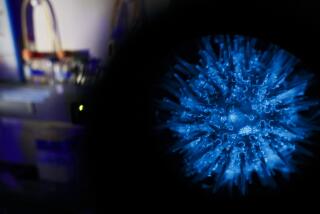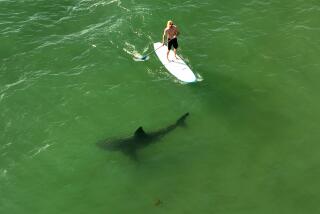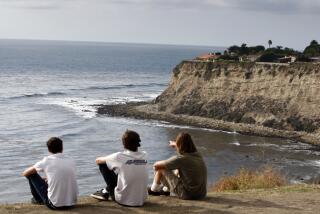Malibu Jury Convicts Diver of Harvesting Undersized Urchins : Marine life: The defendant’s claim that the sea creatures shrunk after being lifted from the ocean is rejected.
- Share via
A Malibu Municipal Court jury has decided that sea urchins don’t shrink--or at least they didn’t shrink enough to acquit a Ventura man charged with harvesting undersized red sea urchins.
In a case that could have had a significant impact on one of California’s most important fishing industries, veteran sea urchin diver Vince Puleo, 50, had argued that between the time he picked the sea urchins from the ocean and the time they were measured by Fish and Game wardens at Ventura Harbor, some of the urchins had shrunk--a contention supported by a defense expert witness.
As Puleo explained before the trial, “Hey, urchins are like anything else. When something dies, it shrinks. When you die, you’re gonna shrink. When an urchin dies, it’s gonna shrink.”
Joseph LeMay, a marine biologist with Aquatic Testing Laboratories in Ventura, testified that the urchins he tested shrank an average of 1/29 of an inch after 16 hours exposure to air and sunlight.
But the jurors didn’t buy the so-called “shrinkage defense.” After only three hours of deliberations Thursday, they voted to convict Puleo.
“The shrinkage defense was so slight that it had no impact at all,” jury foreman Charles Pond of Agoura Hills said after the verdict.
Pond added, however, that the jury agreed with at least one of Puleo’s arguments in the case--that the law regarding sea urchin harvesting is somewhat vague.
“We were not happy with the way the law reads,” Pond said, “but there was nothing we could do about that.”
The jury also convicted Christopher Michalak, who worked for Puleo as a diver, of possessing undersized sea urchins, but it acquitted another of Puleo’s divers, Michael Parish, of the same charge, largely on the grounds that Parish was unwittingly using a defective gauge to measure the urchins before harvesting.
State law prohibits Southern California urchin divers from possessing more than 30 urchins of less than 3.25 inches in diameter--not including the spines--in a single load. Game wardens testified in the trial that when Puleo brought his boat, Sea Breeze II, into the dock at Ventura Harbor on Dec. 15, 1992, he had 221 undersized or “short” urchins in his load. The wardens said some of the urchins were as much as an inch short--a contention hotly disputed by Puleo.
The warden “must have been dreaming,” Puleo testified. “There were no short urchins in it.”
The trial was held in Malibu because state Fish and Game officials argued that the urchins were taken from waters off of Los Angeles County.
Sea urchins are ball-shaped, spine-covered bottom feeders that belong to the same marine animal group as starfish and sand dollars. Ironically, until about 20 years ago, California sea urchins were regarded as pests because they often overgrazed undersea kelp beds, to the point where they sometimes were poisoned or smashed with hammers in vast numbers in order to save the kelp.
But in the early 1970s, California divers began harvesting sea urchins for sale in Japan, where uni or sea urchin “roe”--a market euphemism for sea urchin gonads--is considered a sushi-style delicacy.
According to foreman Pond, none of the eight women and four men on the Malibu jury had ever eaten sea urchin roe. In fact, when a dead sea urchin was displayed to the jury, several jurors seemed repelled at the sight. A court clerk, meanwhile, balked when she was asked to stick an exhibit sticker on the spiny corpse.
Sea urchin harvests in California have skyrocketed over the past two decades. In 1971, only 200 pounds of sea urchins were “landed” in California. In 1988, however, 52 million pounds were landed, almost all of it going to the Japanese market.
During the past few years, concerns about overfishing of sea urchins has resulted in new size limits and closed fishing periods. It also has led to efforts to reduce the number of licensed divers--there are about 500 now--and increased enforcement of urchin regulations. Last year, according to Department of Fish and Game officials, 16 citations were issued for urchin violations in Southern California, four times as many as three years ago.
In the past, urchin divers who were cited often simply pleaded no contest to the charges, paid a fine and went back to their fishing. But Fish and Game officials now are planning to initiate license suspension or revocation proceedings against divers convicted of violations.
“There’s a lot of people out there waiting for licenses,” said Steve Capps, a Fish and Game spokesman. “So why not weed out the bad ones and make room for the good ones?”
The Fish and Game crackdown has led to some concern, however, that courts would become clogged with costly, time-consuming jury trials as urchin divers who were cited would go to trial rather than risk losing their licenses after a no-contest plea. (L.A. County Municipal Court trials cost an estimated $2,379 per day; the Malibu trial lasted four full court days.)
Already, Fish and Game officials say, district attorneys in some California counties have at least temporarily refused to prosecute misdemeanor Fish and Game violations, citing a lack of resources.
But department officials say they now are planning to institute administrative proceedings against alleged violators, taking many Fish and Game cases out of the court system entirely.
Malibu Municipal Court Commissioner Robert McIntosh set an Oct. 1 sentencing date for Puleo and Michalak, who face maximum penalties of six months in jail and a $1,000 fine. Deputy Dist. Atty. Phillip Stirling, who prosecuted the case, said he will request the maximum fine and community service for Puleo, but lesser penalties for Michalak.
Puleo was not in court for the verdict. But he said beforehand that if convicted he planned to appeal.
Times correspondent Matthew Mosk contributed to this story.
More to Read
Sign up for Essential California
The most important California stories and recommendations in your inbox every morning.
You may occasionally receive promotional content from the Los Angeles Times.










